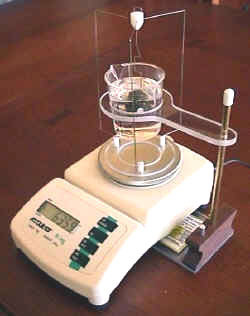Specific Gravity
Specific gravity is a special case of relative density. That is, a substance’s density is divided by the density of water at 4 F (0 C). Since water has a density of 1 gram/cm3 and all of the units cancel, specific gravity is the same number as density, but without any units (dimensionless).
Relative density is another dimensionless number that measures any substance’s density in relation to another. A relative density greater than 1 (one) means that the substance in the numerator has a bigger density than the one in the denominator and vice versa.
When the same concept is applied to specific gravity, if the substance is not miscible with water (does not mix or dissolve) it will float if its specific density is more than 1 (one) and will sink if the specific gravity is less than 1 (one).
Density is the ratio between mass and volume. It reveals interesting information about a substance and affects the way atoms and molecules in a substance are arranged. Atom and molecule arrangement depend on temperature among other things.
How to Determine Specific Gravity
Liquids: A liquid’s specific gravity can be determined with a hydrometer. The depth to which the hydrometer sinks is inversely proportional to the liquid’s specific gravity. A hydrometer is a hollow, sealed, calibrated glass tube.
Solids: Some electronic scales can measure a solid’s specific gravity. This is particularly useful for determining a gem’s purity.
Gases: Specific gravity transducers measure a gas’s specific gravity. They are particularly useful to power, oil, gas, aerospace, and process industries.
Practical Specific Gravity Uses
Specific gravity measurements can be used in a wide variety of industries. It is particularly useful because it allows access to molecular information in a non-invasive way.
Gem Purity: The purity of a gem can be determined by comparing its specific gravity with the patron number (measured over a gem with high purity level). This allows the gem’s value to be determined very quickly.
Eggshell thickness: Eggshell thickness is an important factor in the poultry industry. It decays with the age of the hen or under adverse conditions. If the thickness falls below certain expected values, the eggs are not marketable. The eggshell mainly determines an egg’s specific gravity, while the other components have specific gravity close to 1 (one) (shell= 2.325; yolk= 1.032; albumen= 1.038; shell membranes= 1.075). One can gain a good idea of the shell’s state by measuring the whole egg’s specific gravity.
Soil’s Compressive strength: Engineers need to know a soil’s compressive strength to choose a construction method (among other things). Specific gravity and compressibility are highly connected and can be obtained one from the other.
Oil Industry: Crude oil and its refined products are normally measured either by volume in gallons and US barrels or by weight in tons. Specific gravity or density can measure the relationship between volume and weight. The specific gravity is related with the ‘degree API,’ a measurement of the oil’s inherent power (regular, super, etc.).
Table of Specific Gravities Used in the Oil Industry
| Product | Specific Gravity Ranges |
|---|---|
| Crude oils | 0.80-0.97 |
| Aviation gasolines | 0.70-0.78 |
| Motor gasolines | 0.71-0.79 |
| Kerosines | 0.78-0.84 |
| Gas oils | 0.82-0.90 |
| Diesel oils | 0.82-0.92 |
| Lubricating oils | 0.85-0.95 |
| Fuel oils | 0.92-0.99 |
| Asphaltic bitumens | 1.00-1.10 |


Comments - 12 Responses to “Specific Gravity”
Sorry but comments are closed at this time.